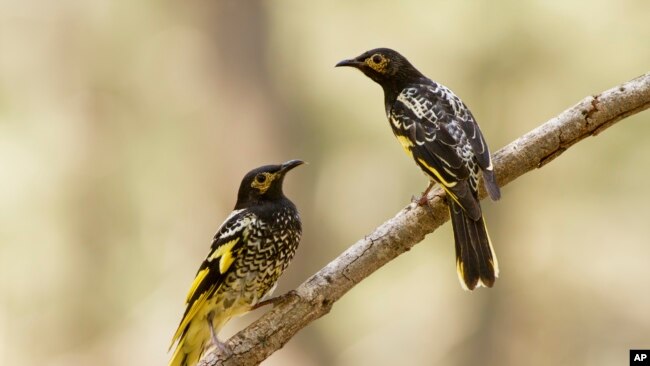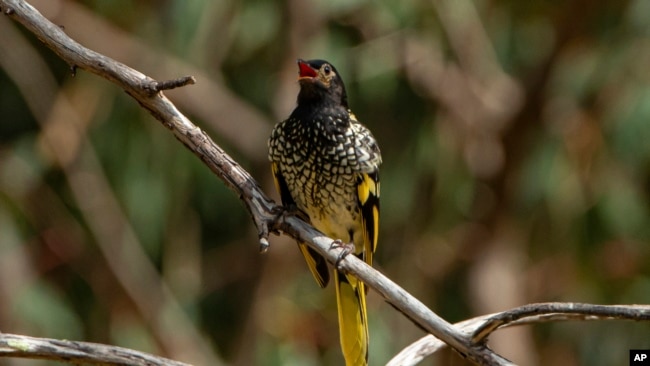鳥とても 学ばにゃ、恋も歌えまじ
これって、人間社会にも当てはまるなぁ〜。
可愛いさえずりは聞こえないけど、鳥を見ているだけで癒されそうな今日のVOA!!
貴重な調査結果です。
研究結果 :鳴き声を失った鳥は結婚相手を見つけにくい
Research: Birds That Lose Their Songs Less Likely to Find a Mate
March 22, 2021
鳴禽類の若いオスは、通常、大人の鳴禽類から歌を学びます。しかし、大人の鳥から歌を教わらないと、若い鳥は相手を引き寄せることができないのです。

オーストラリア国立大学の生態学者ロス・クレイツ氏は、5年前からregent honeyeatersリージェント・ハニー・ウォーターと呼ばれる鳥の歌唱力と交尾の成功率を研究しています。この黒と黄色の鳥は、かつてはオーストラリア全土に生息していました。しかし、1950年代以降、生活の場が失われたため、現在では300~400羽の野生鳥獣が生息するのみとなっています。
かつては冬になるとオスの鳥が大きな群れを作っていました。今では国中に散らばっているため、多くの鳥が単独で飛んでいます。そのため、幼鳥が生まれて1年の間に近くにいるhoneyeater ミツスイの大人が少なくなってしまったのです。
※ honeyeater:【hʌ́niìtər】オーストラリアに生息し、花のミツのほか木の実や虫を食べる野鳥
「多くの鳥の歌の学習は、人間が言語を学ぶのと同じように、他の個体の声を聞いて学ぶプロセスです」とクレイツ氏は言います。
「他の個体の声を聞くことができなければ、何を学べばいいのかわからないのです。」
研究者たちは、多くのオスの鳥が、他の種でしか使われていない曲を学んでいるようであることを発見しました。リーゼントミツスイのオスの約12%が、フリアブドリやクロフサスズメなどが通常歌っている歌のバージョンを作っているのです。
今回の研究は、Proceedings of the Royal Society B英国王立協会紀要に掲載されました。その結果、通常とは異なる歌を歌うオスは、仲間を集めるのに成功していないことがわかりました。
ジョージタウン大学の保全生物学者であるピーター・マーラ氏は、今回の研究には参加していません。彼は、「今回の研究は、個体数が非常に小さくなった時点で歌の言語が失われると、衰退が加速する可能性があることを示唆しています。」と述べています。

Lachlan Hallが提供した2015年の写真では、オーストラリア・ニューサウスウェールズ州のCapertee Valleyに生息するリージェント・ハニーウォーターのオスの鳥が写っています。
メスがオスを受け入れない正確な理由は明らかになっていません。
スコット・ラムジー氏は、カナダ・オンタリオ州にあるウィルフリッド・ローリエ大学の行動生態学者です。彼はこの研究には参加していません。ラムジー氏は、鳥の歌は広告のようなものだと言います。「雄鳥が鳴くということは、私はここにいます...そして私はパートナーを見つけることにとても興味があります という広告を出しているようなものです。」
さらにラムジー氏は、メスのハナドリはこのような変わった歌い方をする鳥を仲間だと認識していないため、近づかないのではないかと付け加えています。あるいは、アプローチしても、”オスが期待通りの行動をしないとうまくいかない”ということもあります。
ほとんどのオスの鳥は、最初の年の数ヶ月間、一生歌い続ける歌を学びます。父親から学ぶ鳥もいます。しかし、リーゼント・ミツバチは歌を覚える前に巣立ってしまうので、オスは他の鳥から学ぶ必要があるのです。
ストニー・ブルック大学の生態学者であるカール・サフィナ氏は、今回の研究には参加していません。彼は、「鳥の歌の文化を保存することの重要性を認識する必要があります。これらの鳥が生き延びるために必要な要素は、本能的なものではなく、学ばなければなりません」と述べています。
クレイツ氏のチームは、今回の発見を実行に移し始めています。繁殖プログラムに参加している若い鳥が音符を覚えるのを助けるために、雄の歌の録音を流し始めました。また、熟練した雄の歌い手を、若い学習者の隣に配置しました。これらの経験豊富な鳥たちが、自分たちの歌を次の世代に伝えてくれることを期待しています。
Research: Birds That Lose Their Songs Less Likely to Find a Mate
This 2016 photo provided by Murray Chambers shows a male regent honeyeater bird in Capertee Valley in New South Wales, Australia.
Young male songbirds usually learn their songs from adult songbirds. But when those young birds do not have older ones to teach them, they have less success attracting mates.
For five years, ecologist Ross Crates with Australian National University has studied the singing ability and mating success of birds called regent honeyeaters. These black and yellow birds were once common across Australia. But loss of their living space since the 1950s has decreased their population to only about 300 or 400 wild birds today.
Male birds once formed large groups in the winter. Now they are spread out across the country, so many fly alone. That means fewer honeyeater adults are nearby during the young birds’ first year of life.
“Song learning in many birds is a process similar to humans learning languages — they learn by listening to other individuals,” said Crates.
“If you can’t listen to other individuals, you don’t know what you should be learning.”
Researchers found that a large number of male birds appear to be learning tunes only used by other species. About 12 percent of male regent honeyeaters end up producing versions of songs usually sung by friarbirds and black-faced cuckooshrikes, among other birds.
The scientists released their research in the publication Proceedings of the Royal Society B. They found that males who sang unusual songs were less successful in attracting mates.
Peter Marra is a conservation biologist at Georgetown University and was not involved in the study. He said, “This research suggests that the loss of a song language once the population reaches a very small size could accelerate their decline.”
The exact reason females do not accept the males was not clear.
Scott Ramsay is a behavioral ecologist at Wilfrid Laurier University in Ontario, Canada. He was not involved in the research. He said the songs were like an advertisement: “When male birds sing, it’s like putting out an ad saying, ‘I’m over here...and I’m really interested in finding a partner.’”
Ramsay added that female honeyeaters may not even recognize these unusual singers as possible mates, and so do not approach them. Or it could be that they approach, “but then things go wrong if the males” do not behave as expected.
Most male birds spend several months in their first year learning the songs they will sing for the rest of their lives. Some birds learn from their fathers. But regent honeyeaters leave the nest before they learn to sing, so the males need to find other birds to learn from.
Carl Safina is an ecologist at Stony Brook University and also was not involved in the research. He said, “We need to be aware of the importance of preserving song culture in birds…some elements of what these birds need to do to survive isn’t instinctive, it has to be learned.”
Crates’ team has begun putting their findings into action. To help young birds in reproduction programs learn their notes, they have started playing male song recordings. They have also placed skilled male singers next to young learners. The hope is that these experienced birds can pass on their songs to the next generation.
Words in This Story
attract –v. to cause (someone) to like or be interested in something
ecologist –n. a person who studies ecology: the science that deals with the relationships between groups of living things and their environment
tune –n. a series of musical notes that produce a pleasing or recognizable sound
accelerate –v. to move faster; to gain speed
decline –v. to become less in number or lower in amount
nest –n. a place where birds lay their eggs and raise their young
instinctive –adj. relating to or based on behavior that is not based on thinking or learning
英語の小窓
be less likely to do:~する傾向が弱い[可能性が低い]
likelyは形容詞です。
また、be less likely that S V.
ex.
It is less likely to rain.
雨は降らないようだ。
He is less likely to come.
彼は来ないらしい。
The plan is less likely to be success.
そのプランは成功する可能性は低い。
反対にlessがない場合
be less likely to do:「…しそうだ」
ですね。
どんどん使って、じぶんのものにしよう!!!
